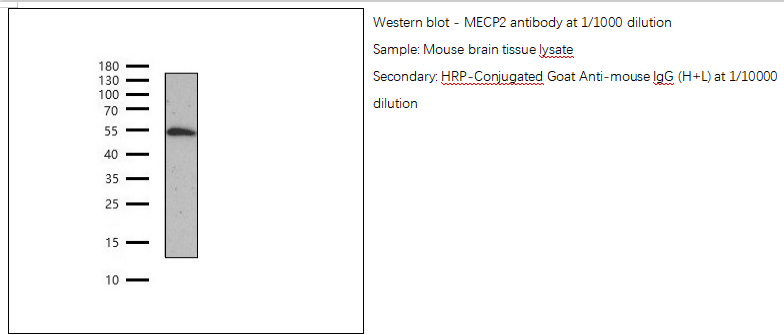MECP2 antibody
Catalog Number:PP1388
- 产品信息
- 相关图片
- 常见问题
|
Basic infomation |
source |
Mouse |
|
Clonality |
Polyclonal |
|
|
Isotype |
IgG |
|
|
Reactivity |
H M R |
|
|
MW (kDa) |
52kDa |
|
|
Purification |
Antigen affinity purfication |
|
|
UniProt ID |
P51608 |
|
|
NCBI Gene |
6990 |
|
|
|
|
|
|
Applications |
Tested Applications |
WB, |
|
Cited Applications |
WB, IHC, IF |
|
|
Product Usage Information |
Western Blotting |
1:1000-1:2000 |
|
Immunohistochemistry |
1:200-1:400 |
|
|
Immunofluorescence |
1:200-1:400 |
|
|
|
|
|
|
Storage |
PBS with 50% glycerol and less than 0.02% sodium azide |
|
|
Store at –20°C, stable for one year after shipment |
||
|
Do not aliquot the antibody |
||
|
|
||
|
Background |
DNA methylation is the major modification of eukaryotic genomes and plays an essential role in mammalian development. Human proteins MECP2, MBD1, MBD2, MBD3, and MBD4 comprise a family of nuclear proteins related by the presence in each of a methyl-CpG binding domain (MBD). Each of these proteins, with the exception of MBD3, is capable of binding specifically to methylated DNA. MECP2, MBD1 and MBD2 can also repress transcription from methylated gene promoters. In contrast to other MBD family members, MECP2 is X-linked and subject to X inactivation. MECP2 is dispensible in stem cells, but is essential for embryonic development. MECP2 gene mutations are the cause of most cases of Rett syndrome, a progressive neurologic developmental disorder and one of the most common causes of cognitive disability in females. Alternative splicing results in multiple transcript variants encoding different isoforms. |
|
|
|
|
|
|
Abbreviation |
H: human M: mouse R: rat Rb: rabbit Hm: hamster Mk: monkey Vir: virus C: chicken Z: zebrafish Dg: dog Pg: pig Hr: horse |
|



 返回列表
返回列表